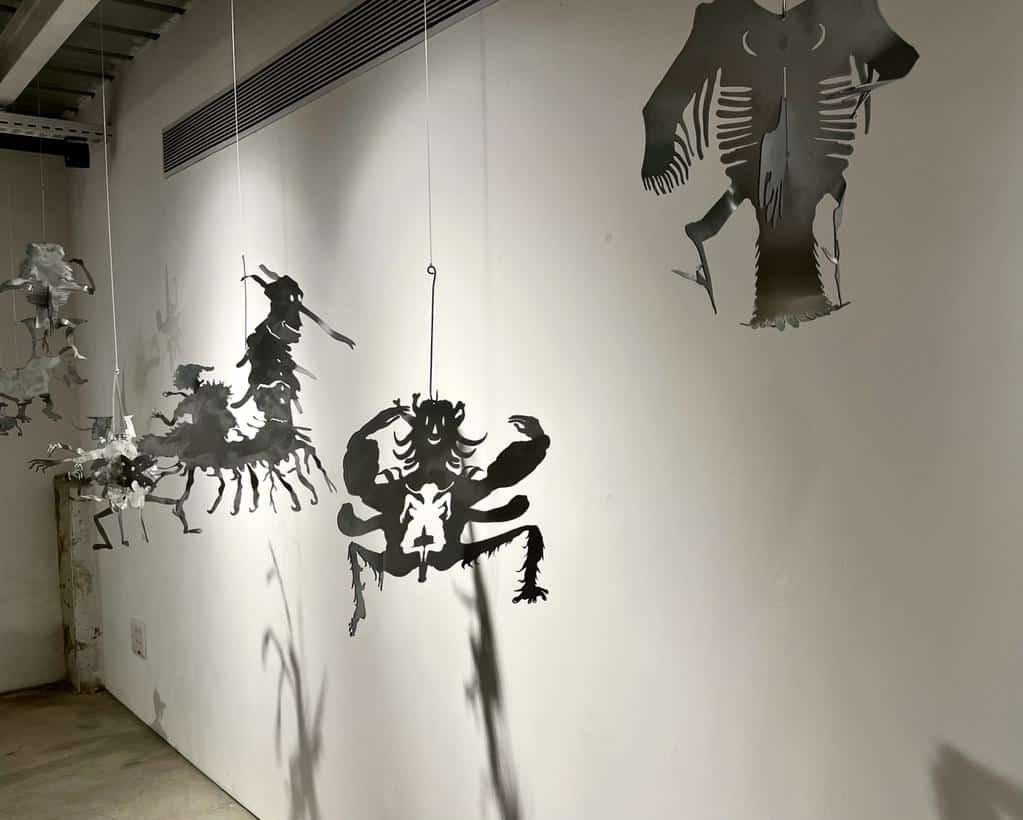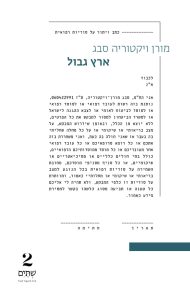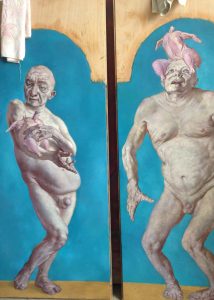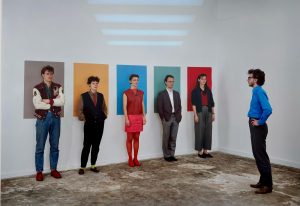גוף, צילום. מציגה חלקים מתוך פרויקטי הגמר של בוגרים ובוגרות המחלקה לצילום בצלאל מקיץ זה.הדבר הראשון הבולט, הוא עד כמה עבודות, שהוצגו לפני כחודשיים בבצלאל בירושלים נראות טובות יותר בגלריה ברוורמן. וודאי שמסגור ואופי החלל תורמים רבות ובכל זאת, דווקא היות שבגלריה מדובר בתערוכה קבוצתית ובמחלקה היו סמי תערוכות יחיד, הדבר מעורר תהיות על ההנחייה או אצירת בתערוכה בבצלאל.

Unloaded Gun 2022
Black and White Photography, Inkjet Print,50×74 cm

העבודות של דניאל ליברמן ,ממוסגרות באלומיניום מבריק, הן כמו סיפורים קצרים מלוטשים. כל פרט בהם הוא חלק משיווי משקל עדין, והם לא בהכרח מסתיימים בפואנטה אך הם נשארים בתודעה. דיוקן סוראליסטי של אשה האוחזת מנורת שולחן כך שהמתג מכסה שד חשוף והאהיל מהווה ספק מסכה, ספק מגן על פניה מתכתב בחופשית עם עבודות סוראליסטים משנות העשרים והשלושים וגם עם העבודה הנחשבת למבשרת ה POP – Just What is It That Makes Today’s Homes So Different, so Appealing? של ריצרד המילטון מ 1956 בה דמות אשה עם אהיל על הראש ויד על החזה.

Untitled 2022
Black and White Photography, Inkjet Print, 50×74 cm
בצילום “אקדח לא טעון” האקדח הוא יד אשה המקופלת אחורי גווה ומרמזת לצורת אקדח כמו במשחקי דמיון. היד שייכת לאשה בחולת תחרה שחורה וסיכה ילדותית מוגדלת בשערה, סיכה שצורתה פשוטה וילדותית אך היא מוגדלת לאביזר אקסטרווגנטי וזול. כאן נדמה שליברמן החצינה את מחשבות של דמות וגם חוסר ישע. ה”אקדח” לא יהפוך למאיים על הנוכחות שאינה נראית. (העבודה השלישית שהיא מציגה, דיוקן עצמי חזיתי, חלשה בהרבה).

סדרת עבודות הידיים של יוני קפלן מצוינת: הוא מצלם יד בשרוול חולצה לבן רכוש בכפתור והופך אותה לדימוי מטונימי של מאבק. למרות שיש משהו צפוי להפליא ביד בשרוול הגברי שמנסה לפרוק עול – פריקת מוסרות הבורגנות לא יכולה להיות מתוארת באופן ישיר יותר – במקרה האיכות והאיפוק הצילומים מונעים תחושה של קלישאה. חבל ששלוש עבודות נוספות של קפלן, נתלו ליד שלט התערוכה במה שהופך אותן להתחכמות עיצובית ריקה. מכל מקום, מעניין יהיה לראות לאן יתפתח.

גם העבודות בחשיפה ארוכה ובטכניקות צילום מוקדמות של אלון קסלר מסקרנות, במיוחד צילום של כיסא נוח עליו ניירות אולי ניירות צילום שמונחים כמו לייבוש והופכים את הכיסא ממקום מנוחה למקום התהוות (עם אזכור רחוק למתקן ייבוש הבקבוקים שהפך פסל אצל דושאמפ).
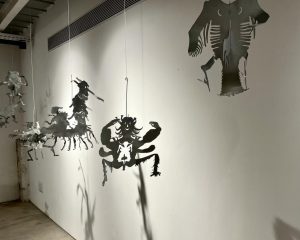
בקומה התחתונה של הגלריה מוצגות עבודות של חליל בלבן ומרב מקמל באופן חלש ביותר. ליד שורת המוביילים, מגזרות המתכת המרחפות כמעט מתבקש לכתוב “This is not Kara Walker “.
אוצר גוף, צילום : דוד עדיקא
הדרכה והכנה עם ד”ר סמדר שפי למטיילים עצמאיים
לביאנלה בוונציה, 2022
הביאנלה היא אירוע האמנות הבינלאומי החשוב ביותר. השנה מציגות 80 מדינות בביתנים לאומיים ובתערוכה הבינלאומית מציגים עוד 213 אמניות ואמנים.לצד הביאנלה מוצגות עוד עשרות תערוכות חשובות במסגרות שונות.
במפגש תקבלו רקע והכנה כידי שתנצלו באופן מרבי את הזמן שהחלטתם להקדיש כמטיילים עצמאיים (לא בקבוצה) לביאנלה – ותתמקדו בחלקים המעניינים ביותר עבורכם.
ההדרכה עם מצגת ומפות .הביאנלה ננעלת ב נובמבר 2022
לפרטים ותאום אנא כתבו מייל ל thewindowartsite@gmail.com
או שלחו הודעת WhatsApp ל 0507431106

“Body of Photography”: Bezalel Department of Photography Graduates at the Braverman Gallery
Graduates of the Bezalel Department of Photography are showing selections from their final projects from this summer. The first thing that stands out is the extent to which the works shown about two months ago at Bezalel in Jerusalem look much better in the Braverman Gallery. True, the framing and character of the space contribute greatly to the look. Nevertheless, since this is a group exhibition, while at the Mt. Scopus campus the graduates showed semi-solo exhibitions, one can only wonder at the mentoring or curatorship of the exhibition in Jerusalem.

Untitled
2022
Black and White Photography, Inkjet Print, 50×74 cm
Danielle Liberman’s photographs in their glistening aluminum frames are like polished short stories. Each detail forms part of a delicate equilibrium: they do not necessarily end with the point, but linger in the mind. A surrealistic portrait of a woman holding a table

lamp so that the switch covers her bare breast and the shade looks like a mask or perhaps a protective covering for her face, corresponds freely with Surrealistic works of the 1920s and ‘30s. It also corresponds with Richard Hamilton’s Just What is it that Makes Today’s Homes So Different, So Appealing? (1956), considered the harbinger of Pop Art, in which a woman’s figure has a lampshade on her head and her hand on her chest.
In her Unloaded Gun, the gun is a woman’s hand folded behind her back in the shape of a gun in imaginary games. The “gun” belongs to a woman in a black lace dress, her hair clasped in a girlish barrette enlarged beyond child-sized into an extravagant, cheap accessory. Here it seems that Liberman externalized thoughts about the figure as well as helplessness. The “gun” will not be able to threaten the invisible facing figure. (Liberman’s third photograph on view, a frontal self-portrait, is much weaker).

Unloaded Gun
2022
Black and White Photography, Inkjet Print,
50×74 cm
Yonatan Kaplan’s series of works focused on hands is excellent: in his photograph of a hand extending from the buttoned sleeve of a white blouse, the hand is transformed into a metonym for struggle. Despite something wonderfully expected about the hand in the man’s shirtsleeve attempting to thrown off bonds – hard to think of a more direct way of depicting divesting oneself of the reins of bourgeois life – in this case, the quality and restraint in the photographs prevents them from being clichéd. Too bad that Kaplan’s three additional photographs were hung near the exhibition sign, which made them into an empty attempt at sophisticated design. In any case, it will be interesting to see how he develops further.

Alon Kessler’s long exposures using early photographic techniques are intriguing, especially the photograph of a chaise longue with papers on it – perhaps these are photographic papers placed there to dry, transforming the lounge chair from a place of rest to a place of becoming (with a faraway hint at the bottle rack that became Duchamp’s sculpture).

On the lower level of the gallery, works by Halil Balabin and Merav Kamel form an extremely weak display. A row of mobiles, metal cutouts should defnitly have a “This is not Kara Walker” label to establish that these heavily influenced pieces carry at least a bit of humor and self-consciousness.
Curator: David Adika
